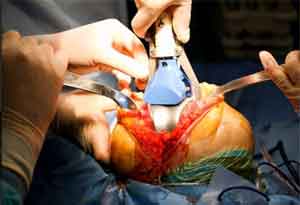- Home
- Editorial
- News
- Practice Guidelines
- Anesthesiology Guidelines
- Cancer Guidelines
- Cardiac Sciences Guidelines
- Critical Care Guidelines
- Dentistry Guidelines
- Dermatology Guidelines
- Diabetes and Endo Guidelines
- Diagnostics Guidelines
- ENT Guidelines
- Featured Practice Guidelines
- Gastroenterology Guidelines
- Geriatrics Guidelines
- Medicine Guidelines
- Nephrology Guidelines
- Neurosciences Guidelines
- Obs and Gynae Guidelines
- Ophthalmology Guidelines
- Orthopaedics Guidelines
- Paediatrics Guidelines
- Psychiatry Guidelines
- Pulmonology Guidelines
- Radiology Guidelines
- Surgery Guidelines
- Urology Guidelines
Liposomal bupivacaine not beneficial for pain management after knee surgery

Contrary to what previous trials have suggested, liposomal bupivacaine, a local anesthetic drug, was not associated with improvement in inpatient opioid prescription or opioid-related complications in patients who received the drug during total knee replacement surgery as a part of post-surgical modern pain management, according to a new study published in journal Anesthesiology.
The study was conducted by Stavros G. Memtsoudis, director of critical care services in the Department of Anesthesiology at the Hospital for Special Surgery in New York, and colleagues to analyze the impact of liposomal bupivacaine use (regardless of administration route) on inpatient opioid prescription, resource utilization, and opioid-related complications among patients undergoing total knee arthroplasties with a peripheral nerve block.
Bupivacaine is a commonly used local anesthetic that prevents pain by blocking signals at nerve endings. Liposomal bupivacaine is a long-acting version of bupivacaine, formulated in a new lipid-based structure. The drug is injected into tissues surrounding the surgical wound. One injection of liposomal bupivacaine is designed to provide long-lasting pain control for up to three days, thereby potentially reducing the need for opioid painkillers.
"When we tested this hypothesis in a real-world setting where state of the art pain procedures such as peripheral nerve blocks were used, we were unable to show benefit," said Dr. Memtsoudis. "Local anesthesia is one mode that has been proposed as being part of a multimodal approach to reducing opioid consumption. But we found that adding liposomal bupivacaine to the mix did not add significant benefit."
While opioid-based regimens remain the cornerstone of postsurgical pain management, a multimodal approach involving a combination of opioids, non-opioid analgesics and local anesthetics - all with different mechanisms of action - is increasingly being used to provide pain relief while reducing the need for postsurgical opioids and opioid-related adverse effects. However, the effectiveness of local anesthetics is limited by a relatively short period of action. Physician anesthesiologists had hoped liposomal bupivacaine, which is released slowly over time, would help solve this problem, Dr. Memtsoudis noted.
The study looked at data from 88,830 total knee replacements performed between 2013 and 2016 with a peripheral nerve block, which involves injecting a local anesthetic near the nerves that control sensation and movement for a specific part of the body, as part of a multimodal regimen. One group had a peripheral nerve block and general anesthesia, and another group had a peripheral nerve block and regional anesthesia. Liposomal bupivacaine was used in conjunction with a peripheral nerve block in 21 percent (18,817) of patients. Between 2013 and 2016, the use of liposomal bupivacaine increased from 7 percent to 26 percent.
Researchers found the addition of liposomal bupivacaine was not associated with a decrease in patients' risk for opioid-related complications including those affecting the respiratory, gastrointestinal and central nervous system. Further, no clinically relevant decrease in inpatient opioid prescriptions, length of hospital stay and no reduction in cost of hospitalization was seen.
"The routine use of liposomal bupivacaine should be carefully examined, especially given its relatively high cost. It does not seem to be the silver bullet physicians have been hoping for," Dr. Memtsoudis said. "We also need to look for other ways to try to combat the opioid crisis, including trying to change physician and patient behavior and expectations. We shouldn't necessarily look at a pharmacological solution for everything."
Researchers note that there's uncertainty in the data as to how liposomal bupivacaine was administered. It's expected that most was administrated by infiltration at the surgical site which is FDA approved, but off-label use is possible in some cases.
For more information click on the link: 10.1097/ALN.0000000000002267

Disclaimer: This site is primarily intended for healthcare professionals. Any content/information on this website does not replace the advice of medical and/or health professionals and should not be construed as medical/diagnostic advice/endorsement or prescription. Use of this site is subject to our terms of use, privacy policy, advertisement policy. © 2020 Minerva Medical Treatment Pvt Ltd